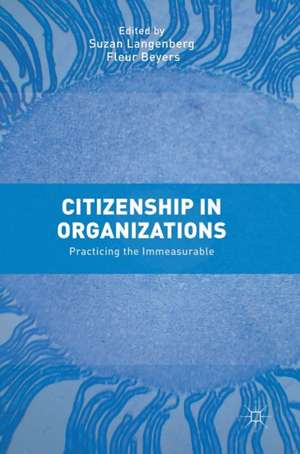Citizenship in Organizations: Practicing the Immeasurable
Editat de Suzan Langenberg, Fleur Beyersen Limba Engleză Hardback – 23 aug 2017
| Toate formatele și edițiile | Preț | Express |
|---|---|---|
| Paperback (1) | 639.41 lei 6-8 săpt. | |
| Springer International Publishing – 11 sep 2018 | 639.41 lei 6-8 săpt. | |
| Hardback (1) | 644.82 lei 6-8 săpt. | |
| Springer International Publishing – 23 aug 2017 | 644.82 lei 6-8 săpt. |
Preț: 644.82 lei
Preț vechi: 758.60 lei
-15% Nou
Puncte Express: 967
Preț estimativ în valută:
123.39€ • 127.49$ • 102.64£
123.39€ • 127.49$ • 102.64£
Carte tipărită la comandă
Livrare economică 19 martie-02 aprilie
Preluare comenzi: 021 569.72.76
Specificații
ISBN-13: 9783319602363
ISBN-10: 3319602365
Pagini: 308
Ilustrații: XV, 311 p. 3 illus.
Dimensiuni: 148 x 210 mm
Greutate: 0.54 kg
Ediția:1st ed. 2018
Editura: Springer International Publishing
Colecția Palgrave Macmillan
Locul publicării:Cham, Switzerland
ISBN-10: 3319602365
Pagini: 308
Ilustrații: XV, 311 p. 3 illus.
Dimensiuni: 148 x 210 mm
Greutate: 0.54 kg
Ediția:1st ed. 2018
Editura: Springer International Publishing
Colecția Palgrave Macmillan
Locul publicării:Cham, Switzerland
Cuprins
Introduction (Suzan Langenberg, Fleur Beyers and Sophie Langenberg).- Economy and immeasurability (Gido Berns).- Meeting at the Boundaries: Marginality as a source of Wealth Reading Genesis 23 (Luc Hoebeke).- Inequality of power (Machiel Karskens).- Politics: understanding a volatile realm (Catherine Susanne Schnitzer).- Is there space for rational thinking in altruism? (Leopold Vansina).- Guiltless Guilt (Hans Wesseling).- Organizing Counter-conduct (Suzan Langenberg).- Emergent Times: Disruptive Logic as a Breeding Ground (Fleur Beyers.- Towards an irony-centered organization (Wim Van Orshaegen).- Biology, identity, ambiguity. The meaning of a diagnostic label for adults diagnosed with autism (Raymond Langenberg & Kristien Hens).- Recognition: a business case for developing through relationships (Anouschka Klestadt).- Facilitating the unexpected (Mirjam Beyers).- Boundaries of the (im)measurable in palliative care (Goedele Vandersloten).- Measuring the immeasurable(Theo Vaes).
Notă biografică
Suzan Langenberg is a researcher, trainer and consultant and holds a PhD in Philosophy and Business Ethics from the Radboud University of Nijmegen, The Netherlands. Suzan is the author of multiple works on criticism and speaking up within an organizational context. Throughout her many years as coach and facilitator, she has built an extensive experience in leadership and organizational issues. Suzan is also active as a moderator of debates on social and philosophical issues.
Fleur Beyers is an editor and researcher with a passion for language and philosophy. As a partner in a consulting firm, she has come across a wide variety of issues relating organizations and the position of the individual therein. She is also the co-owner of a Brasserie/Bar, which has provided her with a great amount of organizational practice. Fleur holds a research Master of Cultural Analysis from the University of Amsterdam, The Netherlands
Textul de pe ultima copertă
This book brings together a wide variety of meta-reflections on shifts in economy, power relations and organizing in confrontation with practices of citizenship. The focus is directed towards the position of (im)measurability of certain changes on meta-level within (organized) practices of citizenship. The organization or ‘organizing’ is the turntable, the metaphor, through which we can exemplify the emergence of growing citizen consciousness. In short, we see ‘organizing’ as the central metaphor wherewith the shift of the societal paradigm
can be tested/verified/examined. In this book, different perspectives shall be represented on how people develop through organizing. It is more or less a residue of invisible processes that take place in and with people, through changes in discourses and in founding new types of communities and networks such as the creation of alternative local (exchange)trade opportunities. Citizenship implies exercise. On behalf of their experience with, through or while working in an organization, people ‘make’ their own membership of a community, an organization and/or a society.
can be tested/verified/examined. In this book, different perspectives shall be represented on how people develop through organizing. It is more or less a residue of invisible processes that take place in and with people, through changes in discourses and in founding new types of communities and networks such as the creation of alternative local (exchange)trade opportunities. Citizenship implies exercise. On behalf of their experience with, through or while working in an organization, people ‘make’ their own membership of a community, an organization and/or a society.
Caracteristici
Presents a unique mix of relevant practical cases combined with theoretical input and reflection from various organizational perspectives Includes contributions from both academics and researchers of organization theory and business ethics Delivers frameworks that will provide academics and researchers with a more realistic view on practices of citizenship Provides a genuine cross-over between philosophy, organization studies and business ethics
